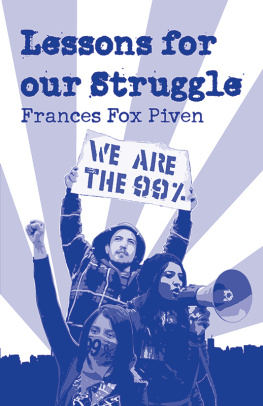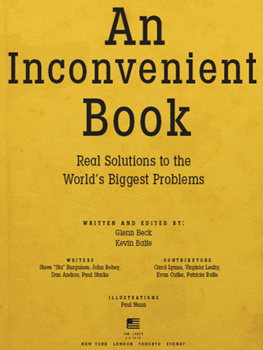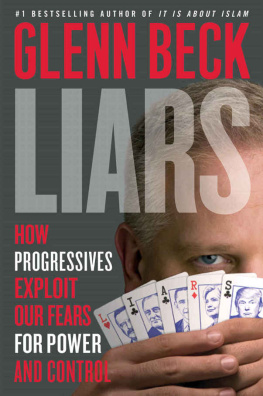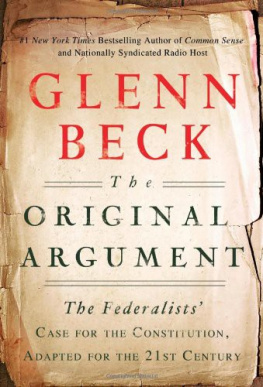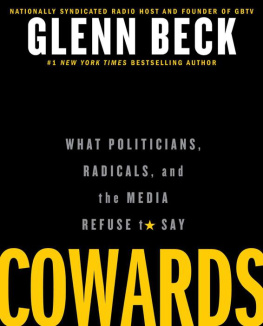Table of Contents
ALSO BY FRANCES FOX PIVEN
Regulating the Poor
(with Richard A. Cloward)
The Politics of Turmoil
(with Richard A. Cloward)
Poor Peoples Movements
(with Richard A. Cloward)
The New Class War
(with Richard A. Cloward)
The Mean Season
(with Fred Block, Richard A. Cloward, and Barbara Ehrenreich)
Why Americans Dont Vote
(with Richard A. Cloward)
Labor Parties in Postindustrial Societies
Breaking the American Social Compact
(with Richard A. Cloward)
Why Americans Still Dont Vote
(with Richard A. Cloward)
The War at Home
Challenging Authority
Keeping Down the Black Vote
(with Lorraine Minnite and Margaret Groarke)
INTRODUCTION
Early in 2010 I received a call from someone who claimed he was a student at Western Michigan State University. He said his class had been assigned my book, Challenging Authority, and, to fulfill his term assignment he wanted to interview me. I thought it was a long drive for an interview, but I was accustomed to students who exert themselves to fill assignments with as little reading as possible. Because I was recovering from an auto accident, I suggested we do the interview at my apartment. On the appointed day, two young men came, I served them tea and cookies, talked to them for awhile, and thought little of it. A couple of weeks later clips from the interview showed up on the Internet. I Googled and discovered that the so-called student was in fact a Michigan Republican activist, and the director of a 501(c)(4) that seemed to be devoted entirely to attacking the Michigan teachers union.
Startled, I Googled some more and discovered that my longtime partner and husband Richard Cloward and I were the central figures in something that Glenn Beck, until recently a Fox News personality, called the Cloward-Piven plan for orchestrated crisis to collapse the system. Our crisis strategy was at the base of the trunk of a Beck-inspired chalkboard diagram called the tree of revolution. The branches of the tree produced not only the National Welfare Rights Organization, in which we had in fact had a role, but ACORN, Students for a Democratic Society, George Soros and Van Jones, the Barack Obama presidency, and the financial meltdown, among others.
The right-wing blogosphere, including Becks own blog, The Blaze, was quick to pick up the orchestrated crisis theory, and their postings elicited many hundreds if not thousands of rude and insulting postings directed at me, and many lurid death threats as well. (Richard Cloward, who would have enjoyed this more than I, has been dead for a decade.) Then, in January 2010, I wrote another article in The Nation, about the difficulties that would have to be overcome if the growing numbers of the unemployed were to be organized and have voice and influence in American politics. In response, the outrage of Beck and the right-wing bloggers escalated, and, so did the insults, the curses, and, especially, the death threats.
Naturally, my students were on to this before I was, and were delighted to have such a notorious professor. When I recovered from my accident and returned to school, they had posted a blowup of the chalkboard diagram on my office door. They laughed, I laughed; it was funny because it was so preposterous. The chalkboard diagrams featured on The Glenn Beck Show hinged on crazy connections, and the blogs were riddled with absurd errors depicting me as puppet master. I taught at Columbia University when Obama was a student there, and so I probably taught him (not true). I spoke at a conference in the early 1980s that he probably attended. (Who knows?) I was on the Obama transition team. Obamas policies, and especially his healthcare reform, are obviously a plan to implement my crisis strategy. None of this is true, of course.
And while its preposterous, maybe ludicrous, it really isnt funny. There are lots of Americans who are ready to believe these sorts of stories. The formula seems to be to shine the spotlight on a real person, and then tell a story that makes that person the villain in a narrative that purports to explain vast political, cultural, and economic changes in American society. The target audience consists of course of the people discomfited with those changes. It is reminiscent of the familiar ploy of attributing bad things that happen to supposed outside agitators or bearded Bolsheviks or Muslims or Jews.
The formula seems to work, at least to the extent that Beck was able to claim an audience of several million. Lunatic though they are, the ravings about our plan for an orchestrated crisis to destroy American capitalism provide explanations of a sort to some of the people who are made anxious by large-scale changes that have overtaken American society. These include deindustrialization and our declining preeminence in the world, changes in family and sexual norms, and perhaps most disturbing of all, the growing diversity of the American population and the election of an African-American president. Social scientists themselves hardly agree about the causes of these developments, and people without the luxury of time and training often find themselves confused and angry.
This is a grave problem. Democratic possibilities crucially depend on the ability of the public to understand what is happening to our society and why, and especially on the ability of the public to decipher the role of government policies. However, who can really figure out the impact of policies to regulate financial institutions, or of policies to reorganize health care services, when the policies and regulations run the length of an encyclopedia and deal with such incomprehensible matters as credit default swaps? The blank space in the democratic process is an invitation to the manufacture of propaganda by the powerful and well-heeled groups who want to limit democratic influence.
Still, the choice of villains in this brand of paranoid propaganda is not entirely random. The crazy story of the Cloward-Piven strategy for manufactured crisis was, as it happens, produced not by Glenn Beck, who, of course, doesnt really do the research he claims to do in the wee hours of the morning. Rather, it was produced by a number of intellectuals of a sort who made the crossing from left to right in the early 1970s. Prominent among them was David Horowitz, who had been an editor of the left-wing Ramparts magazine, but became a vocal right-wing polemicist and has become known for naming the 100 radical academics he considers most dangerous.
In a 2006 book written with Richard Poe, The Shadow Party: How George Soros, Hillary Clinton, and Sixties Radicals Seized Control of the Democratic Party, Horowitz said that the strategy outlined in our 1966 article was a blueprint to collapse the capitalist system. Others, including Fred Siegel of the Manhattan Institute, James Sleeper, an adjunct fellow at the Hudson Institute, and Ron Radosh of pajamasmedia.com, made similar albeit less histrionic claims. So, the story was available for the Beck programmers to use with no research at all. This part of the story of how I became a feature in the Glenn Beck world is I think simply idiosyncratic.
However, there is nevertheless a pattern in the selection of targets by the manufacturers of paranoid propaganda. The bad guys are all figures on the left. The bad movements are all movements of the left, including SDS and ACORN. I want to emphasize that slander campaigns of this sort can have serious consequences, and I dont mean personal consequences for me. Of course, misleading people is, of itself, serious. But ACORN, the largest and most effective organization of poor and minority people in the country, was destroyed by this sort of campaign. One of the things that ACORN did was register poor people to vote. A massive voter registration effort by ACORN in 2005 in the state of Florida succeeded in winning a big hike in the state minimum wage. That victory sparked a relentless series of attacks on ACORN as a criminal conspiracy to fraudulently register voters, attacks that were mindlessly echoed by the mainstream media, with the result that ACORNs funding dried up.


